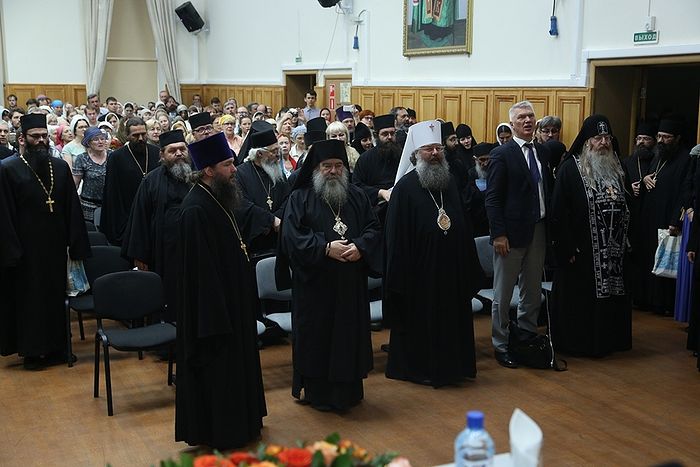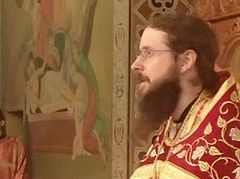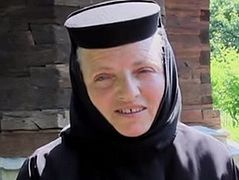Ekaterinburg, May 30, 2016
From May 27 to 29, with the blessing of His Holiness Patriarch Kirill of Moscow and All Russia the international monastic conference “The Patristic Heritage in Light of Athonite Tradition: Spiritual Guidance,” attended by bishops, thirty abbots and abbesses, and more than 150 monastics from Russia,Greece, Cyprus, France, Germany, and Ukraine, was held in the hall of the spiritual-educational center of the Diocese of Ekaterinburg, reports the site of the Synodal Department for Monasteries and Monasticism.
The Synodal Department for Monasteries and Monasticism was represented at the conference by its Deputy Chairman Igumena Yuliana (Kaleda), abbess of the Zachatevsky Stavropegial Women’s Monastery in Moscow.
The conference was dedicated to the one thousand year anniversary of the Russian presence on Athos and bore a special Athonite spirit. Amongst the guests were twelve Athonite fathers, including Archimandrite Alexei, abbot of Xenophontos, and Archimandrite Methodios, abbot of Chilandar.
Of course, Athonite abbots were invited to the monastic gathering not only for the sake of the commemoration. The Holy Mountain is the cradle of Russian monasticism. Receiving the monastic tradition of the Holy Mountain a thousand years ago, Rus’ was deeply rooted in its culture, having given the universal Church hundreds of saints, and today the Holy Mountain with its inviolable spiritual traditions is a fount of inspiration for the monastics of the Russian Church.
There were notable words from the report of Archimandrite Antipas, the superior of Iveron’s St. Anna kelli, who said: “Monasticism presents itself as the highest spiritual inhabitation in the whole Church.” These wonderful words, from one side, inspire, and from another side, oblige the many. Bishops, abbots, simple monks—all must take care that our monasticism would be worthy of its high calling, that our monasteries would be, as Archimandrite Alexei said, truly “divine armies.”
One of the main paths to this, ringing out in the very title of the conference, is the concern for spiritual guidance. How can a modern monk attain holiness? How can he learn to ever remember God and to live in His presence? The main assistance in this for a monk is his spiritual father, the abbot. Every abbot and abbess, as was stated in several reports, is given unique opportunities. They are the fathers and mothers for their brother- and sisterhoods—that is, they are able to give their children life in Christ.
The abbot is for his monks, as Fr. Alexei expressed, “A father, steward, doctor, teacher, salt and light.” Namely, the abbot unites “the dispersed children of God,” people with different characters, weaknesses and habits into one spiritual life. That is, he constantly encourages the brothers and uplifts their thoughts to God.
As quite truthfully revealed in the presentation of Metropolitan Athanasius of Limassol, the abbot is called to keep the brotherhood from five basic temptations. The first of these is exhaustion from labors, exceeding our strength. And one of the cares of the abbot is to vigilantly follow behind them so that the brotherhood would have zeal and strength for spiritual podvigs. The abbot himself is called to always have a cheerful spirit and a peaceful state, inasmuch as the abbot and brotherhood are “communicating vessels:” the condition of the spiritual father is necessarily passed on to his children. The second temptation is spiritual self-sufficiency, when the brotherhood takes no advice from others and judges other orders. This leads to spiritual isolation and the development of spiritual ailments. The third temptation is violating the principle of ecclesial unity. Monasticism is a child of the Church, and only in unity with the Church does it grow and bring forth fruit. Therefore for the abbot it is extremely important to nurture the brotherhood in the spirit of obedience and love for the Church and her arch-pastors. The fourth temptation is worldliness. The duty of the abbot is to constantly inspire the brothers, so that they would with zeal follow the narrow, but sweet path, not carried away by predilections towards worldly things, not searching out worldly acquaintances and activities. Finally, one more common temptation is vain activity. As Vladyka expressed, numerous obediences constantly multiply and steal the hearts of the brethren and abbot, guiding them away from spiritual activities. To avoid this temptation, the abbot must ensure that the brotherhood not violate the established order connected with the services, night prayer, reading, labors and rest. Those monasteries where the monks don’t have the opportunity for daily solitary prayer before God head towards the brothers becoming tired and disappointed with the spiritual life.
The abbot as a spiritual parent tirelessly raises his children, striving to bring them to the measure of the stature of Christ. This is precisely the purpose of the monastic upbringing: not in forcing a monk to outwardly observe monastic rules or customs, but in gradually forming Christ within them. What are the methods of spiritual upbringing, of spiritual improvement provided the abbot by monastic tradition?
First, as mentioned by every speaker, is teaching a monk the art of arts—obedience. As precisely noted in the report of Archimandrite Iliy, the spiritual father of the Monastery of the Transfiguration of the Lord in France, free obedience is first, thanks to which a monk attains to life in God. Renouncing his own will, the monk mysteriously and incomprehensibly attains to the fullness of inner freedom, and before him, as Archimandrite Alexei said, are opened the Heavenly Mysteries: the mysteries of prayer, humility, love, mercy, and spiritual contemplation.
Secondly is the revelation of thoughts—an action upon which depends the spiritual health of a monk, as Archimandrite Methodios, abbot of Chilandar Monastery, observed. Through this work the abbot transmits to the monk the experience of his life in God, and the monk attains discernment and will learn to see his passions and awaken a resolute battle against them. As concerns this activity, as Fr. Methodios underlined, a proper attitude is demanded from both sides: from the monk—complete trust in the abbot, and from the abbot—fatherly wisdom and sacrificial love. Such love often happens as a true ascension to the cross, and for the sake of the salvation of his spiritual children the abbot must be prepared to assimilate himself to Christ, as Fr. Iliy said in his report.
Many reports reiterated the idea that a monk is before all a man of prayer. Therefore one of the first virtues, which the abbot as spiritual father cultivates in a monk, is love for the Divine services and prayer in his cell. In the services a monk enters into living communion with the Heavenly Church and joins in the zeal of the saints.
And finally, the abbot teaches his children to preserve the spirit of stillness, to which the detailed report of Archimandrite Elisha, the abbot of Simenopetra Monastery, was dedicated. This report was read by the superior of the kelli of St. Modestus of Simenopetra Monastery, Hieromonk Abramius. Fr. Elisha described one of the main principles of monastic life in his report: secluding oneself in his cell to converse with God, preserving oneself from extraneous conversations, not turning to anyone for a special friendship, the monk enters with the brothers into a deep and genuine communion. His heart becomes open to all, it becomes aflame with the love of Christ, and such a monk is always welcoming and joyous and ready to help. Here are the fruits of proper stillness: the thirst for prayer and active love for one’s fellow man.
One of the most powerful means of edifying the soul of a monk is education by word, that is, conversations of the abbot with the brothers, both communal and personal. Fr. Iliy quite correctly noted that the mystery of the fellowship of the brethren in Christ is accomplished during communal conversations of even the simplest content.
Thus, these are the rungs upon which the abbot guides his monks towards holiness. As Archimandrite Antipas subtly noted in his report, holiness is not something conferred upon you automatically, even if you live on the Holy Mountain. Holiness is the insatiable thirst for Christ. Fr. Antipas offered a definition of the true monk: “It is he who has nothing in his life except for Christ.” To take up this style of life means to embark upon the path to holiness.
The conference brought to all a sense of unity and living communion in Christ. The presenters were posed with many interesting, vital questions, and the answers were exhaustive and profound, presenting a true orientation for the spiritual life. The discussion concluded in common prayer, chanted in an Athonite style by the Athonite fathers present, giving all a distinct feeling of inspiration.




